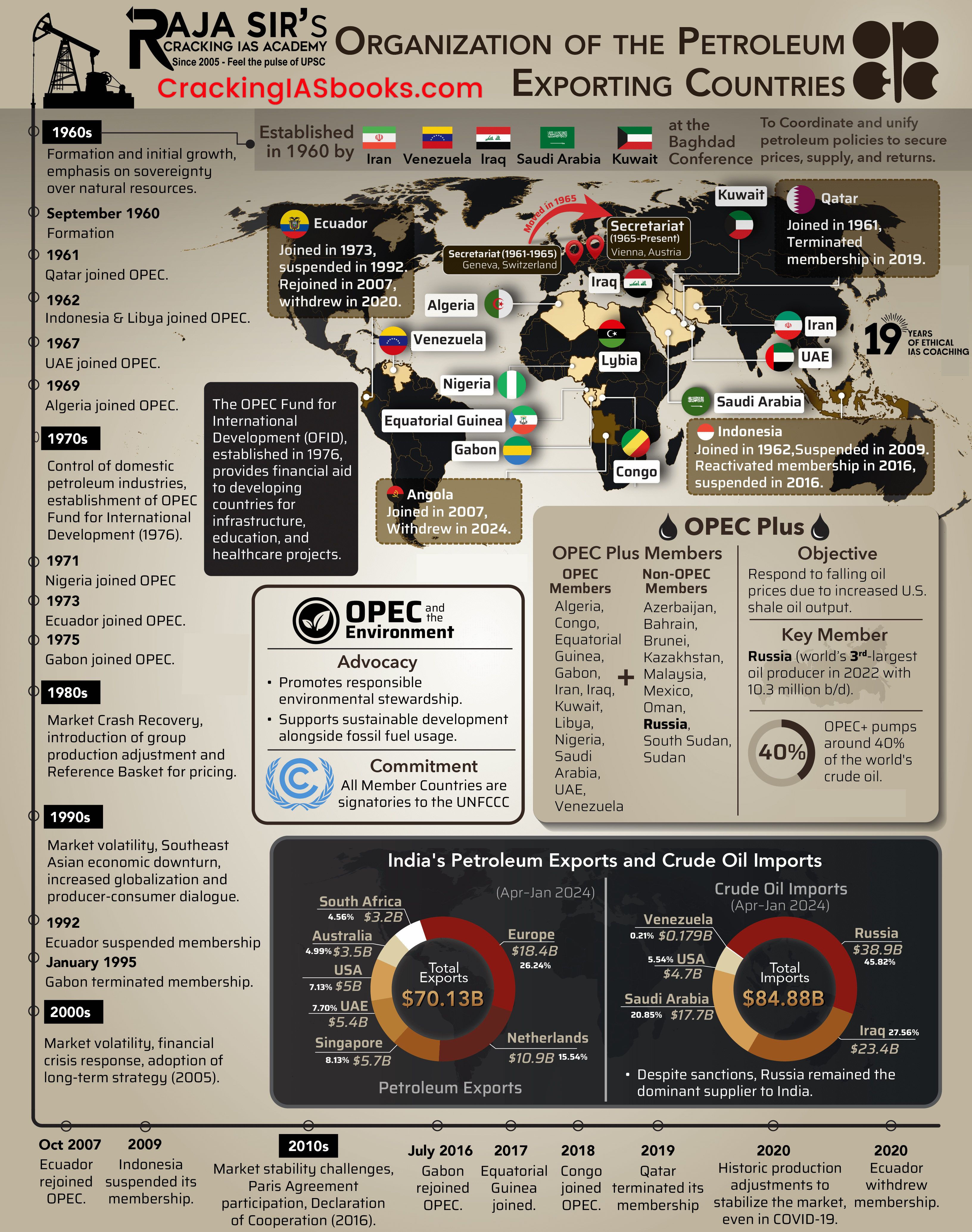- Home
- Prelims
- Mains
- Current Affairs
- Study Materials
- Test Series
OPEC and OPEC+
- OPEC, an acronym for the Organization of the Petroleum Exporting Countries, is an international governmental organization comprising 13 member countries. It was established in Baghdad on September 14, 1960, by the initial five members (Iran, Iraq, Kuwait, Saudi Arabia, and Venezuela). Despite its main headquarters being in Vienna, Austria, since 1965, Austria itself is not a member state of OPEC.
- The thirteen member countries collectively accounted for approximately 44% of global oil production and 81.5% of confirmed oil reserves worldwide. This significant share has empowered OPEC to exert substantial influence on global oil prices, previously determined by the “Seven Sisters,” a group of multinational oil companies.
- Since its inception, OPEC has played a pivotal role in the crude oil and derivative markets, controlling petroleum prices and production arrangements. The organization aims to coordinate oil policies among its member countries to ensure stability in global oil prices. Additionally, OPEC seeks to maintain the relationship between manufactured goods prices and oil prices, protecting oil-exporting nations that depend on a steady income for development. Furthermore, OPEC safeguards these nations from economic impacts caused by consuming countries and addresses factors that could lead to oil price deterioration to prevent adverse effects on global markets.
- OPEC was established in response to the actions of some oil-producing countries and multinational corporations acting as a cartel, manipulating and controlling oil prices. OPEC’s formation allowed oil-producing nations to assert their opinions and intervene by setting pricing ceilings, thus granting OPEC a significant role in global oil markets.
- OPEC gained prominence after the 1973 Arab Israeli War when Iran and Saudi Arabia, along with their allies, decided to use oil as a weapon by reducing production and exports. Since then, OPEC has been able to influence oil prices and implement its oil policies globally, breaking the monopoly previously held by major corporations.
- Due to the substantial gap between declared oil prices and state revenues starting in 1974, OPEC decided to ensure member countries’ oil revenues ranged between $10 and $12 per barrel, considering production costs for each member. The goal was to standardize oil prices.

- In September 2016, an agreement in Algeria, involving 23 oil-exporting countries, including 13 OPEC members, aimed to reduce oil production to improve market prices. This agreement was termed OPEC Plus.
- OPEC Plus includes major oil-producing nations such as Russia, Azerbaijan, Kazakhstan, Bahrain, Malaysia, Mexico, Sudan, and Oman. Despite being around 50 years younger than OPEC, OPEC Plus is more powerful due to its control over the richest global oil and natural gas reserves.
- OPEC Plus controls approximately 35% of global oil supplies and 82% of the world’s oil reserves. Both OPEC and OPEC Plus strive to achieve several objectives, including coordinating and unifying petroleum policies, providing balanced and stable prices for oil-producing nations, regulating oil supply to consuming countries, ensuring global oil price stability, and providing a steady income for oil-producing nations.
- In conclusion, OPEC’s crucial role in global oil markets involves operating within an appropriate price framework that balances supply and demand. This becomes especially important amid economic and geopolitical uncertainties, conflicts, and wars in oil-producing countries. Even in OPEC’s absence, a regulatory body is necessary to stabilize oil prices to meet global demand.
How do OPEC decisions affect the global economy?
- Some of the production cut decisions have had significant effects on the global economy.
- During the 1973 Arab-Israeli War, Arab members of OPEC imposed an embargo against the United States in retaliation for its decision to re-supply the Israeli military, as well as other countries that supported Israel. The embargo banned petroleum exports to those nations and introduced cuts in oil production.
- The oil embargo pressured an already strained U.S. economy which had grown dependent on imported oil. Oil prices jumped, causing high fuel costs for consumers and fuel shortages in the United States. The embargo also brought the United States and other countries to the brink of a global recession.
- In 2020, during COVID-19 lockdowns around the world, crude oil prices slumped. After that development, OPEC+ slashed oil production by 10 million barrels a day, which is equivalent to around 10% of global production, to try to bolster prices.









 Latest News
Latest News
 General Studies
General Studies